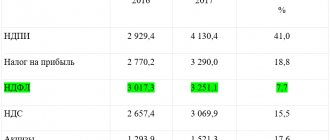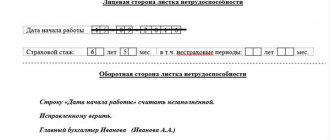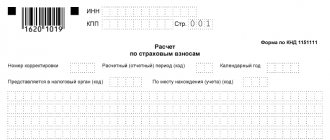When is the first report submitted after registering an individual entrepreneur?
The deadlines for submitting declarations directly depend on the chosen taxation regime and the availability of employees. The Federal Tax Service and funds are constantly changing forms and reporting forms - you need to constantly be aware of all updates, since a declaration in an outdated format will not be accepted.
If an individual entrepreneur plans to hire employees under an employment contract or a civil contract, it is necessary to register with the Social Insurance Fund as an employer. After registration, regardless of the tax regime, you are required to provide income reports for all your employees.
- The first reporting is SZV-M, a mandatory monthly report on employed workers, the deadline for submission is until the 15th of the next month + SZV-Experience - reporting reflecting the insurance experience of employees is submitted annually before March 1 to the Pension Fund of the Russian Federation.
- SZV-TD - information about the labor activity of employees, submitted every month to the Pension Fund of the Russian Federation, before the 15th day of the month following the reporting month.
- 4-FSS contains data on accruals for insurance premiums for “injuries”. The FSS accepts the report quarterly until the 20th in paper format and until the 25th in electronic format.
- DAM - the entrepreneur submits calculations for insurance premiums to the Federal Tax Service quarterly by the 30th day following the reporting period.
- 6-NDFL contains information about the accrued wages of employees in general. The report is submitted quarterly, before the last day of the month following the reporting quarter. 2-NDFL - an annual certificate indicating the employee’s earnings with a breakdown for each month. At the end of the year, reports are submitted by March 1, 2020 to the Federal Tax Service.
When to pay taxes for the first time after opening an individual entrepreneur, terms and dates of payment
The question of when an individual entrepreneur should start paying taxes is relevant and no less important. Payment deadlines depend on the tax regime you have chosen for yourself.
- Simplified taxation system.
Tax period – calendar year . Advance payment based on the results of the reporting quarter is provided until the 25th. The single tax itself is calculated at the end of the year (taking into account all advance payments) and paid before April 30. It is impossible not to pay quarterly advance payments, otherwise penalties will be charged.
The amounts are calculated based on the income you actually received. If no activity was carried out, then you submit a zero declaration and do not pay taxes.
- Single tax on imputed income - this tax is imposed on estimated income and is paid quarterly by the 25th.
However, according to the Tax Code, payers of this type of tax are registered and removed from it within 5 days from the beginning and end of the activity. That is, it is believed that if you do not carry out activities or do not receive income, then deregister and that’s it. Submission of zero reporting on UTII is not provided.
- Patent taxation system - in this case, tax refers to the amount paid for a patent.
- Unified agricultural tax - in this case, an advance payment is also provided, which is made no later than 25 days after the reporting period. The annual tax deadline is March 31st.
Payment of insurance premiums must begin from the moment of acquiring the status of an individual entrepreneur, i.e. inclusion in the Unified State Register of Individual Entrepreneurs. Termination of activity is an exception from the above register. Insurance premiums begin to be calculated from the next day after registration (the date of registration in this case is not taken into account).
Contributions to pension and health insurance are made in any case, regardless of whether any business activity is carried out at all, and what mode you are in. Payment to the Social Insurance Fund is made only if there are employees.
What an individual entrepreneur may need to get started: current account, stamp, cash register, etc.
What a beginner entrepreneur needs:
- Register with the State Tax Service.
- Depending on the type of activity chosen, notify the relevant authorities. For example, you must notify Rospotrebnadzor about the start of an individual entrepreneur’s activities if you provide:
- hotel services;
- domestic services;
- catering services;
- retail or wholesale trade;
- production of garments, clothing, leather goods, etc.
The full list is specified in Resolution No. 584.
- If a license or special permit is required to carry out an activity, then issue it accordingly.
An individual entrepreneur for beginners should also know what he may need for work (this provision is advisory or for individual cases):
- Current account – opened by a businessman as necessary for non-cash payments to clients. This is a right, not an obligation. There is no need to notify the Federal Tax Service.
- Printing – its presence is also not necessary. But if a businessman thinks that the presence of a seal gives him respectability and additionally protects his documents, then he can produce it without any problems.
- The situation is slightly different with cash register equipment. According to Russian legislation, individual entrepreneurs making payments using cash or payment bank cards are required to use it. However, in this case there are exceptions. For example, if an individual entrepreneur provides services to the population using the simplified tax system, then he may not have a device, but must issue the buyer a strict reporting form.
What reports to submit if the individual entrepreneur opened at the end of the year
If you opened an individual entrepreneur at the end of the year between December 1 and December 31, the reporting period begins from the date of registration with the tax office until December 31 of the following year. Under the simplified tax system, the tax period will end on December 31 of the next year.
For example, if registration as an individual entrepreneur took place on December 15, 2019, the annual report must be provided at the end of 2020.
For UTII, reports must be submitted by January 20 of the following year, unless the individual entrepreneur was registered more than 10 days before the end of December.
We recommend reading: What kind of reporting does an individual entrepreneur submit to the tax office and funds in 2020: types, rules, dates and deadlines.
Examples of calculation of contributions if an individual entrepreneur is not registered from the beginning of the year
Let’s say an entrepreneur registered with the Federal Tax Service on March 1, 2020 and worked until the end of the year. The calculation interval contains only full months. The fixed payment of contributions must be withdrawn for 10 months of 2020:
- For pension insurance. First, the contribution amount per calendar month is calculated - 2212.08 rubles. (26,545 / 12). At the next stage, the final value of the contribution for time worked in 2020 is calculated - RUB 22,120.80. (2212.08 * 10).
- For health insurance. The monthly contribution is 486.67 rubles. (5840 / 12), for the partially worked year 2020 you need to pay 4866.70 rubles. (486.67 * 10).
How to calculate taxes and contributions if there is an incomplete calendar month in the billing period? For example, an individual entrepreneur registered in March, but not on the 1st, but on the 12th. In this situation, there will be 9 full months, and 1 incomplete month (March). For March, you need to do the calculation by day. The final calculations will be as follows:
- For pension insurance. For 9 months you need to pay 19,908.75 rubles. (26,545 / 12 x 9). For March, the amount to be paid is 1427.15 rubles. (26,545 / 12 / 31 x (31 – 11)). The final amount of pension contributions is RUB 21,335.90. (1427.15 + 19,908.75).
- For health insurance. For 9 months, 4,380 rubles are payable. (5840 / 12 x 9). March contribution obligations amount to RUB 313.98. (5480 / 12 / 31 x (31-11)). The total amount is 4693.98 rubles. (4380 + 313.98).
Read also: Individual entrepreneur taxes in 2020 for themselves
IP on OSNO
An individual entrepreneur who has not submitted a notification to the tax office about the transition to a certain regime automatically switches to the OSNO regime. Individual entrepreneurs in the general taxation system are required to report on income received in VAT and 3-NDFL declarations.
VAT declaration
The VAT report is submitted to the Federal Tax Service every quarter. If the registration of an individual entrepreneur occurred less than 10 days before the end of the quarter, the first report should be submitted only at the end of the next quarter.
That is, if an individual entrepreneur opened on December 24, 2020, the report is submitted at the end of the first quarter - until April 25, 2020 inclusive, indicating transactions for December.
If an individual entrepreneur is registered more than 10 days before the end of the quarter, the first report is submitted before January 25.
Declaration 3-NDFL
3-NDFL is due every year until April 30. An entrepreneur who registered an individual entrepreneur at the end of the year transfers personal income tax only at the end of the next year.
Briefly about registering a business in the form of an individual entrepreneur
The rules for registering an entrepreneur are enshrined in the provisions of Chapter VII.1 of Law 129-FZ dated 08.08.01. Article 22.1 contains an exhaustive list of documents. Russian citizens have enough:
- Make a statement. Form P21001 is filled out according to the rules approved by the tax service. A free program on the website of the Federal Tax Service of the Russian Federation helps you avoid mistakes. Codes of economic activity, the exact name of the inspection, digital designations - all columns will be filled in in accordance with current standards.
- Identification. Traditionally, this is a passport, but the law allows for alternative options. A clear copy with a registration note must be attached to the application.
- Duty payment receipt. Registration will cost entrepreneurs 800 rubles. The rate has not changed for several years, and parliament is discussing the issue of transferring the procedure to the free category.
To avoid delays in processing documents, lawyers recommend attaching a copy of the TIN certificate to form P21001. Additional paperwork may be required when registering foreigners or minors. The implementation of certain directions will require the presentation of a certificate of no criminal record. The law allows 3 days for making an entry in the unified register.
Important! Simultaneously with the registration form, it is allowed to send a notification of the transition to a special tax regime.
You can submit an application in person, by mail, by courier or through electronic channels. The first option eliminates the need to notarize the signature. The authenticity of the stroke will be confirmed by inspection staff. If documents are sent through the website of the Federal Tax Service of the Russian Federation, a qualified digital signature will be required.
Declaration for individual entrepreneurs on the simplified tax system
Reporting under the simplified system consists only of a declaration according to the simplified tax system. It is submitted annually, the report for 2020 must be sent by April 30, 2021 inclusive. The declaration is submitted every year, and advance payments are paid quarterly.
We recommend reading: Taxes and reporting of individual entrepreneurs on the simplified tax system 6% + what is considered income and how to work with primary documents.
Tax office: registrar and controller
Chapter 2 of the Civil Code states that entrepreneurs must register as individual entrepreneurs with the tax authorities, calculate and withhold taxes on profits. They also submit tax and accounting reports to government agencies.
The Federal Tax Service not only manages the collection of taxes, but also identifies people who conduct business activities without registering an individual entrepreneur. Such citizens are fined under Article 14.1 of the Code of Administrative Offenses in the amount of up to 2,000 rubles. Also, the Federal Tax Service can, through the court, obtain from an entrepreneur compensation for taxes that the state did not receive during the period of its activity.
An entrepreneur is held criminally liable under Article 171 of the Criminal Code if his activities caused major damage or generated large income. Damage or income in the amount of more than 2 million 250 000 rubles is considered major.
In the event of legal proceedings, the Federal Tax Service is obliged to prove that the citizen is an illegal entrepreneur, and is not simply exercising his right to civil transactions.
So, Zhenya will work for herself. And the dumplings will work for him and generate income. Therefore, the Wife needs to pay taxes on this income. After all, his idea meets all the criteria of entrepreneurship.
VAT declaration
Reporting under the value added tax regime is submitted no later than the 25th day of the month after the quarter. If the individual entrepreneur was registered more than 10 days before the end of the year, the declaration is submitted before January 25, if less than 10 days - before April 25.
An individual entrepreneur may be exempt from filing a VAT return. To do this, a notification is submitted to the Federal Tax Service that the activity is not related to the sale of excisable goods and the amount of proceeds from the sale of goods and provision of services for 3 consecutive months amounted to no more than 2 million rubles.
Taxpayers: individuals and individual entrepreneurs
Let's figure it out, why should Zhenya share his income at all?
He made it himself, he sold it himself, he spent it himself. What I didn't sell, I ate. But there is one thing. According to Article 57 of the Constitution, everyone is obliged to pay taxes and fees. If Zhenya were a foreigner, he would still need to pay tax to the budget of the country where he operates in order to make a profit.
Employees of organizations are individuals. They pay income and personal property taxes. They must meet the requirements of the position and carry out instructions from employers. But at the same time, they have the right to vacation, sick leave and other guarantees provided for by the Labor Code.
Zhenya pays tax on his six hundred square meters, but he’s tired of paying 13% of his salary and cooking pizza “for his uncle.” Now he will make dumplings and work for himself.
Those who work for themselves are called entrepreneurs. Entrepreneurship is an activity aimed at obtaining systematic profit from the use of property, sale of goods, performance of work or provision of services.
What should an entrepreneur do at the end of the year?
The year is ending, which means it's time to take stock. What do business owners need to do on the eve of the New Year? How to prepare for further effective work?
Transfer insurance premiums (for yourself)
Each individual entrepreneur must pay their own insurance premiums. It doesn’t matter whether you are running a business and earning income. No later than December 31, you must transfer 17,328 rubles. to the Pension Fund and 3399.05 rubles. to the Federal Compulsory Medical Insurance Fund. Although you can pay your fees in installments, it is better to pay them off before the end of the year, otherwise you will be charged a penalty. If you have an agreement with the Social Insurance Fund, then pay these contributions as well. The main thing is to remember to do this before the end of the calendar year.
Has your income this year exceeded 300 thousand rubles? Then, before April 15 of the next year, you will need to transfer an additional payment to the Pension Fund, which is 1% of income over 300 thousand. See more details here.
Transfer insurance premiums (for employees)
It is also better to transfer employee contributions at the end of the current year. In this case, you can include them in expenses when calculating tax according to the simplified tax system “Income minus expenses.” On UTII or simplified tax system “Income” - reduce taxes by this amount.
Calculate inventory balances
Conduct an annual inventory. Find out whether the actual quantity of goods matches the data in the documents. Based on the results of calculations, surpluses or shortages of goods may be revealed. The amount of loss due to the shortage must be written off as expenses within the framework of natural loss, the norms of which are established by the Government of the Russian Federation. Excess goods will be considered your non-operating income.
Reconcile settlements with counterparties
If you have a large number of suppliers and significant amounts of revenue, it is advisable to reconcile settlements with counterparties. Draw up reconciliation reports and send them to counterparties. The reconciliation will show possible errors in the financial statements.
Specify terms of contracts
Many contracts with suppliers of goods or services are concluded with subsequent automatic renewal. But there are contracts for 1 year, check if the terms expire before the holidays and extend them if necessary.
Consider whether it is worth changing the tax regime or object
If you want to change the OSN to the simplified tax system starting in the new year or change the taxable object “Income” to “Income minus expenses,” then you need to submit an application to the tax office before December 31.
Switch to a new accounting system
The beginning of the year is always the best time to start working with an accounting system. It doesn’t matter whether you kept records in another program or recorded all transactions in a regular notebook. In any case, at the beginning of a new period it is more convenient to evaluate the results of work for the previous year. It is necessary to enter into the new system general results for different areas of accounting: first of all, these are the balances of goods in warehouses, debts of partners, balances of money in the cash register and in current accounts.
“Big Bird”, a cloud service for small companies operating in the field of trade and services, will help you properly organize warehouse, financial and operational accounting in your company. Our system has all the advantages of an online application, and at the same time looks like a desktop program familiar to the user. It's better to see once than to hear a hundred times, so open the demo version right now and evaluate the ease of use and convenience of the system.
The end of the year is not only a time to take stock, but also to lay the foundation for future development. We wish your business prosperity next year!
Established deadlines for paying taxes for individuals in 2020
Paying taxes is an integral part of the economic life of citizens, regardless of their status. It doesn’t matter whether a person is an individual entrepreneur, the founder of an LLC or just an individual. There is no doubt that the amount of taxes in different statuses differs from each other, but everyone has the obligation to pay contributions. For individuals, this is a tax on property, real estate, vehicles, etc.
If individual entrepreneurs and LLCs pay fees for their commercial activities, which is expressed in various amounts, the chosen tariff rate and other nuances, then the individual is subject to taxes on personal property.
For payment, special time intervals are provided that follow the expired period. For example, the deadlines for paying taxes for individuals in 2020 for a vehicle provide for the period of the end of 2020. The payment arrives in October, and must be paid before December 1st.
Depending on the type of tax, the terms and methods of repayment of contributions may have a distinctive appearance from each other. If the owner of the property or real estate evades financial obligations, he faces fines and penalties for the available amount, and in case of further refusal to pay, administrative punishment in the form of a second fine.
The final measure of influence on the debtor is the organization's appeal to bailiffs, after which the debt is collected forcibly.
Article 48 of the Tax Code of the Russian Federation. Collection of taxes, fees, insurance premiums, penalties, fines at the expense of the taxpayer’s property








